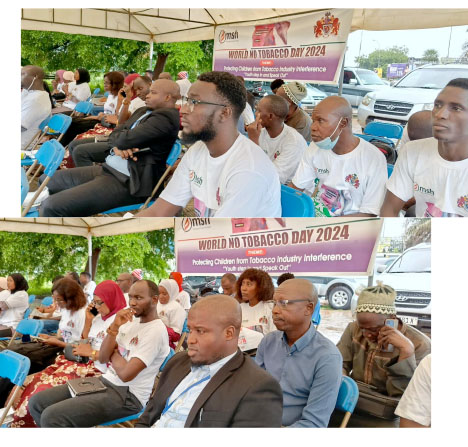
The commemoration took the form of a march pass from Africell head office along Kairaba Avenue to Youth Monument at West Field, where officials reminded communities on the harmful consequence of tobacco use.
The World No-Tobacco Day, commemorated each year on 31st May, is a day set aside by Member States of the World Health Organisation since 1988 to awaken global attention to the tobacco epidermic, which is one of the biggest public health threats the world has ever faced, killing over 8 million people globally on annual basis.
The theme for this year’s commemoration was ‘protecting children from tobacco industry interference’.
Welcoming the gathering, Musa Camara, regional health director, Western One Health Region, made reference to the theme of this year’s commemoration, which he said, calls for concerted thorough partnership and effective communication network between partners for improved health and wellbeing of the population especially the future generation.
Director Camara acknowledged that the entire country is at high risk of tobacco effects in the households, work places and even in public places such as markets.
In a statement read on behalf of the country representative of the World Health Organisation, Momodou Gassama health specialist at the WHO country office, revealed that this year marks the 36th edition of the global solidarity and crusade against tobacco.
“Indeed, the world has reasons for devoting so much attention to the tobacco epidermic, which is one of the biggest public health threats the world has ever faced, killing over 8 million people a year around the world. More than seven million of those deaths are the result of direct tobacco use while around 1.3 million are the result of non-smoker being exposed to second hand smoke.”
Gassama reminded that it must be borne in mind that all forms of tobacco use are harmful and there is no safe level of exposure to tobacco.
“Whether through smoking cigarette, which is the commonest form of tobacco use worldwide, or through other tobacco products such as waterpipe tobacco, cigars, cigarillos, heated tobacco, roll-your own tobacco, pipe tobacco, bidis and kreteks and smokeless tobacco products.”
He revealed that it is disturbing to note that around 80% of the 1.3 billion tobacco users worldwide live in low and middle incomes countries, where the burden of tobacco related illness and death is heaviest.
He also gave harrowing statistics about the effects of tobacco on the health and wellbeing of people.
Mamadi Dampha, deputy permanent secretary at the Ministry of Finance, deputising for the minister for Finance and also on behalf of the Ministry thanked the Health Ministry for the event, acknowledging that the two Ministries have been collaborating in different spheres for many years, but tobacco taxation became more prominent in the fight against tobacco.
“We are happy that the collaboration between our two sectors in this area is growing strength to strength. Our records show that through the Ministry of Health and with the support of the WHO, some members of our staff were trained on tobacco tax modelling in 2012.”
In a statement read on behalf of the Minister of Health, Dr. Momodu T. Nyassi, acting director of Health Services, described the day as a reflection for all because no one is spared from the negative consequences of tobacco use.
“As alluded to by the WHO rep, tobacco is destructive to our health, our environment, our economies and our livelihoods in general. We thank the World Health Organization for consistently generating the science to support these claims. We are told that tobacco kills over 8 million people globally each year.”
He went further to ask how a country is affected by this global threat and what fuels this threat in the country?
“The answers are obvious. It is of great concern that nearly 16% of our population aged 15 years and above smoke cigarette and further 8.4% of our youth aged 12 to 20 years use shisha, another deadly form of tobacco now getting out of hand.”
Minister Samateh reminded that what is even worrying is the fact that about 11% of the country’s young children aged (13- 15) use any form of tobacco products; 9.2 of them smoke tobacco and about 7% of them smoke cigarettes.




